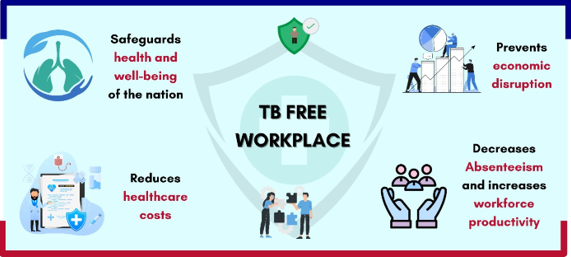The economic burden of TB in terms of loss of lives, income and workdays is substantial. TB usually affects the most economically productive age group of society resulting in a significant loss of working days and pushing people with TB further into the vortex of poverty due to catastrophic costs. India has more than 500 million workers, majority of whom work in unorganized sector with no or limited access to healthcare and social security. A worker with TB might lose an average of 3–4 months of work and income, resulting in potential losses of 20-30% of their annual household income. The economic burden caused by TB in India has been estimated to be over 13000 crores INR every year.7,8

The world of work can play a critical role in ending TB in India. TB epidemic leads to substantial economic repercussions for both individuals and organizations due to lost productivity, worker absenteeism and employee turnover. Employers need to assume an accountability to adopt and implement a TB Free Workplace intervention. A healthy workforce results in higher productivity making supportive workplace policies mutually beneficial for the industry and its employees. A successful and innovative TB Free Workplace model implemented by any organization, puts them in the forefront of the nation’s movement to end TB.
References:
7 Research for Action: Understanding and controlling TB in India. SEARO, WHO, New Delhi, 2000
8 The Economic impact of Tuberculosis. The Stop TB Initiative, WHO, Geneva, 2000
- Printer-friendly version
- Log in to post comments